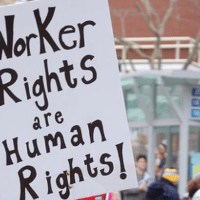This page will be updated as more results become available.
 March 4, 2020 – In the Democratic presidential primary held yesterday in California, Bernie Sanders, who has an A+ rating from NORML based on his policy to deschedule marijuana and legalize it nationwide, is carrying California with 33.6% of the vote. Ex-VP Joe Biden, who has consistently opposed cannabis as a “gateway drug” and now says he favors “decriminalizing” cannabis, has a C- grade from NORML and has won only 24.8% of the vote in California (so far).
March 4, 2020 – In the Democratic presidential primary held yesterday in California, Bernie Sanders, who has an A+ rating from NORML based on his policy to deschedule marijuana and legalize it nationwide, is carrying California with 33.6% of the vote. Ex-VP Joe Biden, who has consistently opposed cannabis as a “gateway drug” and now says he favors “decriminalizing” cannabis, has a C- grade from NORML and has won only 24.8% of the vote in California (so far).
Michael Bloomberg, with a D rating from NORML, got 14.4% of the vote, and has now dropped out of the race, pledging to support Biden. Releasing a plan to legalize marijuana days before the election didn’t seem to have helped Elizabeth Warren, who won only 12.3% of the vote and has now suspended her campaign.
LOCAL MEASURES AND RACES
Only one of seven local cannabis reform measures on the ballot carried in the state.
The City of El Monte voted by 71% to tax cannabis businesses with Measure PC, making its 2/3 threshold (because it earmarks where the taxes will be spent); however opponents are mounting an initiative campaign to ban cannabis businesses for the November ballot.
In the minus column, the City of San Fernando passed its Measure MJ to ban all commercial cannabis by a 54% – 46% margin. And both competing measures to allow cannabis businesses in Kern County lost, by upwards of 58% of the vote.
The City of Avalon had two measures on the ballot: Measure E to expand its allowance of medical delivery to medical/recreational deliveries lost with 58% of the vote against it. And Measure F to allow for a cannabis business storefront was defeated by 65% of the vote.
In Trinity County, Measure A to establish taxes on marijuana cultivation and sales was narrowly defeated (by 7 votes).
In the Los Angeles District Attorney race, incumbent Jackie Lacey beat her progressive challengers but failed to win over 50% of the vote and will face former SF DA George Gasçon in a November run-off. Lacey announced last month she would expunge 66,000 past marijuana convictions in LA, something Gasçon pioneered in San Francisco.
CONGRESSIONAL RACES
In Duncan Hunter’s former San Diego Congressional District 50, Democrat Ammar Campa-Najjar took 34% of the vote and will face Republican Darrell Issa for the seat in November. Campa-Najjar has the support of San Diego NORML. Issa has a dismal voting record on marijuana.
In District 25, the Los Angeles-area seat that Katie Hill is vacating, Democratic Assemblywoman Christy Smith lost to Republican challenger Mike Garcia. Smith has a good voting record on cannabis and will face Garcia again in a November rematch.
In the 42nd district (southwest Riverside county), marijuana opponent Ken Calvert (R) will face a challenge from progressive Democrat Liam O’Mara in November. O’Mara’s website says, “The war on drugs was a bad idea from the start, and drug enforcement needs to end – drug addiction is a medical issue, not a criminal one, and I am for decriminalization and amnesty for non-violent users.”
In District 21, the Central Valley district where Democrat TJ Cox narrowly unseated Republican David Valadao in 2016, the two candidates will have a re-match in November. Cox is friendly to marijuana but Valado isn’t.
And in the huge 8th Congressional district stretching from Mono Lake to Twentynine Palms that is being vacated by Paul Cook, Republican Assemblyman Jay Obernolte and Democrat Chris Bubser were the top two vote-getters who will vy for the seat in November. Obernolte has a “D” rating from NORML. In 2018, he voted against AB 1793, to expunge past marijuana convictions and also voted against bills to allow for cannabis compassion programs, veterinarians to recommend cannabis, and schoolchildren to use medical marijuana. He did vote yes on a bill (AB2020) to expand places where cannabis events can be held and AJR 27 to ask the DOJ to allow cannabusinesses in California.
STATE LEGISLATIVE RACES
In Senate District 17 (Santa Cruz), Democrat John Laird won 44% of the vote over his Republican challenger Vicki Nohrden (32%). Laird is supported by local marijuana reform advocates and will face Nohrden in the fall.
In state Senate District 13, the Silicon Valley seat being vacated by Jerry Hill, Democrat Josh Becker won 27% of the vote in a crowded field where Republican Alexander Glew won 17% and will face Becker in November. Becker had positive, thoughtful responses to Cal NORML’s candidate survey, and favors legalization.
And in the Special Election in District 25 (Palm Springs), Republican Assemblywoman Melissa Melendez is coming in with 41% of the vote with Democrats Elizabeth Romero earning 22% and Joy Silver 21%. Melendez has not voted well for marijuana; the others are in favor of legalization. Melendez went on to win the seat in May.
LONG LINES AND FINAL RESULTS
Voters in Los Angeles reported standing in line for as long as four hours to vote, as “new vote centers that opened 10 days before election day were part of a revamped system that consolidated roughly 4,500 voting locations into 978 vote centers in neighborhoods stretching from Lancaster to Long Beach….Sanders filed a complaint in federal court late Tuesday, asking the county’s vote centers to stay open an extra two hours, arguing that voters were denied their constitutional right. The county registrar denied the request.” (LA Times).
California Senator and former presidential candidate Kamala Harris tweeted 20 minutes before polls closed that, “You’re allowed to vote as long as you’re in line by 8 p.m.—no matter how long it takes.” She also tweeted, “Waiting in long lines for hours to vote should not happen anywhere in America. We must do better.”
In Beverly Hills, city spokesman Keith Sterling estimated people some waited two hours or more. The city of 35,000 sued the county, calling the new voting system interface severely flawed. “There’s a lot of frustration, (and) people walk away. I don’t know if they’ll come back. I hope they do,” Beverly Hills City Council member Julian Gold said.
According to the AP, “election workers in 15 counties, including Fresno, Napa and Sacramento, were unable to connect to the statewide voter registration database.” Sanders’s complaint also alleged that in one LA location, check-in stations and voting machines were not working.
Full results for California won’t be known for weeks, as mail-in and provisional ballots are counted. With its top-two primary system, the two candidates with the most votes will compete in November for the win, regardless of party.



